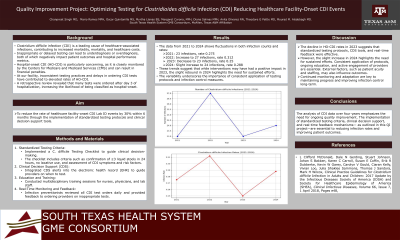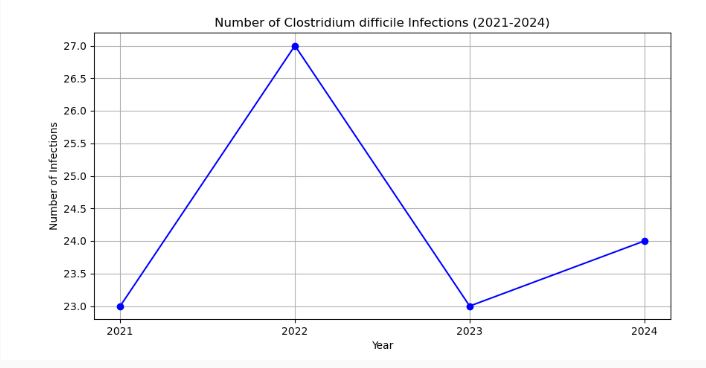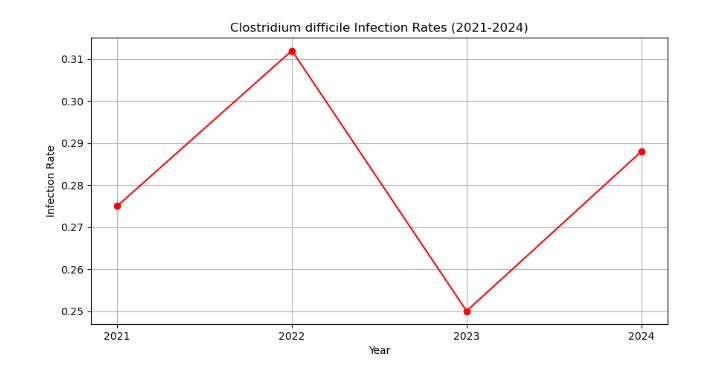Monday Poster Session
Category: Infections and Microbiome
P3417 - Quality Improvement Project: Optimizing Testing for Clostridioides difficile Infection (CDI) Reducing Healthcare Facility-Onset CDI Events
Monday, October 27, 2025
10:30 AM - 4:00 PM PDT
Location: Exhibit Hall


Chanpreet Singh, MD
South Texas Health System GME Consortium
McAllen, TX
Presenting Author(s)
Chanpreet Singh, MD1, Mario Ramos, MPH2, Oscar Quintanilla, MS2, Myrtha Llanas, BS2, Margaret Corona, MPH2, Diana Salinas, MPH2, Anita Olivarez, RN2, Mourad M. Alsabbagh, MD3, Theodore G Pettle, MD2
1South Texas Health System GME Consortium, McAllen, TX; 2South Texas Health System, McAllen, TX; 3South Texas Health System, Edinburg, TX
Introduction: Clostridium difficile infection (CDI) is a leading cause of healthcare-associated infections, contributing to increased morbidity, mortality, and healthcare costs. Inappropriate or delayed testing can lead to underdiagnosis or overdiagnosis, both of which negatively impact patient outcomes and hospital performance metrics. Hospital-onset CDI (HO-CDI) is particularly concerning, as it is closely monitored by the Centers for Medicare and Medicaid Services (CMS) and can result in financial penalties
Methods: 1. Standardized Testing Criteria:
2. Clinical Decision Support (CDS)
3.
3. Education and Training:
4. Real time Monitoring and Feedback:
Results: Between 2021 and 2024, the facility observed fluctuations in healthcare facility-onset Clostridium difficile infection (HO-CDI) rates. In 2021, there were 23 infections (rate: 0.275), which increased to 27 infections (rate: 0.312) in 2022. Following the implementation of standardized testing protocols and clinical decision support tools, a notable improvement was observed in 2023, with infections decreasing to 23 (rate: 0.25). However, a slight rebound occurred in 2024, with 24 infections (rate: 0.288). These trends suggest that while interventions were effective in reducing HO-CDI rates initially, sustained and consistent application is essential to maintain improvements.
Discussion: The decline in HO-CDI rates in 2023 suggests that standardized testing protocols, CDS tools, and real-time feedback were effective. However, the slight increase in 2024 highlights the need for sustained efforts. Consistent application of protocols, ongoing education, and provider engagement are essential. External factors like patient acuity and staffing may also influence outcomes. Continued monitoring and adaptation are key to maintaining progress and improving infection control long term.


Disclosures:
Chanpreet Singh, MD1, Mario Ramos, MPH2, Oscar Quintanilla, MS2, Myrtha Llanas, BS2, Margaret Corona, MPH2, Diana Salinas, MPH2, Anita Olivarez, RN2, Mourad M. Alsabbagh, MD3, Theodore G Pettle, MD2. P3417 - Quality Improvement Project: Optimizing Testing for <i>Clostridioides difficile</i> Infection (CDI) Reducing Healthcare Facility-Onset CDI Events, ACG 2025 Annual Scientific Meeting Abstracts. Phoenix, AZ: American College of Gastroenterology.
1South Texas Health System GME Consortium, McAllen, TX; 2South Texas Health System, McAllen, TX; 3South Texas Health System, Edinburg, TX
Introduction: Clostridium difficile infection (CDI) is a leading cause of healthcare-associated infections, contributing to increased morbidity, mortality, and healthcare costs. Inappropriate or delayed testing can lead to underdiagnosis or overdiagnosis, both of which negatively impact patient outcomes and hospital performance metrics. Hospital-onset CDI (HO-CDI) is particularly concerning, as it is closely monitored by the Centers for Medicare and Medicaid Services (CMS) and can result in financial penalties
Methods: 1. Standardized Testing Criteria:
- Implemented a C. difficile Testing Checklist to guide clinical decision-making
- The checklist includes criteria such as confirmation of ≥3 liquid stools in 24 hours, no laxative use, and assessment of CDI symptoms and risk factors.
2. Clinical Decision Support (CDS)
Integrated CDS alerts into the electronic health record (EHR) to guide providers on when to test.
3.
3. Education and Training:
- Conducted multidisciplinary training sessions for nurses, physicians, and lab staff.
4. Real time Monitoring and Feedback:
- Infection Control Team reviewed all CDI test orders daily and Provided feedback to ordering providers on inappropriate tests.
Results: Between 2021 and 2024, the facility observed fluctuations in healthcare facility-onset Clostridium difficile infection (HO-CDI) rates. In 2021, there were 23 infections (rate: 0.275), which increased to 27 infections (rate: 0.312) in 2022. Following the implementation of standardized testing protocols and clinical decision support tools, a notable improvement was observed in 2023, with infections decreasing to 23 (rate: 0.25). However, a slight rebound occurred in 2024, with 24 infections (rate: 0.288). These trends suggest that while interventions were effective in reducing HO-CDI rates initially, sustained and consistent application is essential to maintain improvements.
Discussion: The decline in HO-CDI rates in 2023 suggests that standardized testing protocols, CDS tools, and real-time feedback were effective. However, the slight increase in 2024 highlights the need for sustained efforts. Consistent application of protocols, ongoing education, and provider engagement are essential. External factors like patient acuity and staffing may also influence outcomes. Continued monitoring and adaptation are key to maintaining progress and improving infection control long term.

Figure: Annual count of healthcare facility-onset Clostridium difficile infections. A peak was observed in 2022, followed by a decline in 2023 after intervention measures were implemented. A slight increase in 2024 suggests the need for sustained efforts.

Figure: Yearly infection rates per 1,000 patient days. The rate decreased significantly in 2023, reflecting the impact of standardized testing protocols and clinical decision support tools, but rose slightly in 2024, indicating room for continued improvement.
Disclosures:
Chanpreet Singh indicated no relevant financial relationships.
Mario Ramos indicated no relevant financial relationships.
Oscar Quintanilla indicated no relevant financial relationships.
Myrtha Llanas indicated no relevant financial relationships.
Margaret Corona indicated no relevant financial relationships.
Diana Salinas indicated no relevant financial relationships.
Anita Olivarez indicated no relevant financial relationships.
Mourad M. Alsabbagh indicated no relevant financial relationships.
Theodore G Pettle indicated no relevant financial relationships.
Chanpreet Singh, MD1, Mario Ramos, MPH2, Oscar Quintanilla, MS2, Myrtha Llanas, BS2, Margaret Corona, MPH2, Diana Salinas, MPH2, Anita Olivarez, RN2, Mourad M. Alsabbagh, MD3, Theodore G Pettle, MD2. P3417 - Quality Improvement Project: Optimizing Testing for <i>Clostridioides difficile</i> Infection (CDI) Reducing Healthcare Facility-Onset CDI Events, ACG 2025 Annual Scientific Meeting Abstracts. Phoenix, AZ: American College of Gastroenterology.
